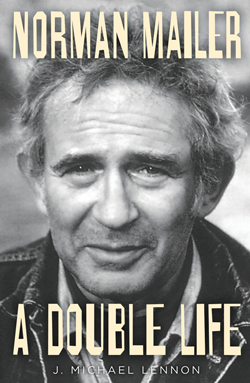Norman Mailer: A Double Life
by J. Michael Lennon
reviewed by Okla Elliott
Here is Jonathan Lethem writing in the Los Angeles Review of Books about Norman Mailer’s place in twentieth-century consciousness:
Challenged once by a friend to name a single immortal literary character from postwar fiction—someone to rival Sherlock Holmes or Madame Bovary in terms of bleed-through to popular consciousness—I blurted out “Norman Mailer!” I was halfway serious.
One would be hard pressed to find a better way to think of Mailer. He turned himself into a character he was constantly creating—either in the public sphere or in his pioneering works of creative nonfiction, where he often appeared as the third-person protagonist of his own narratives. In effect, Mailer was constantly chronicling not only the major events in twentieth-century American history but also his own life, with all its victories and vicissitudes.
Existentialist philosophy tells us that we have no stable identity, that we constantly make and re-make ourselves via our actions. Mailer, who claimed to be the first American existentialist author, could be said to have turned his life into an experiment in proving that claim true. Mailer’s mercurial and ever-mutable identity is at the center of J. Michael Lennon’s biography, and Lennon does an admirable job of allowing Mailer’s various iterations of himself to emerge without judgment or apology. Lennon chooses Norman Mailer: A Double Life as the title of the book, but it might have been more accurately titled Norman Mailer: The Container of Multitudes.
Lennon includes the well-known episodes of Mailer’s life: his time as a soldier on the Pacific front during the Second World War, his meteoric rise to fame after the publication of The Naked and the Dead, the stabbing of his second wife, Adele, his various feuds with other major literary figures, and his myriad sexual affairs. Many readers will have heard about these events already, but they have likely encountered two-dimensional versions of them. Lennon fleshes out each one to the fullness of lived life. Lennon also includes much material that even Mailer fans might not have encountered, such as his often-troubled relationship to his Jewishness, his father’s degenerate gambling habits, a sci-fi novel he wrote for his mother (who adored him and considered him a genius almost from the time of his birth), his time spent studying French at the Sorbonne on the G.I. Bill, and behind-the-scenes anecdotes about the publication histories of his many books.
One less well-known aspect of Mailer’s life is his relationship with the Polish-French writer Jean Malaquais. Mailer and Malaquais became friends while Mailer was living in Paris after the Second World War. Unlike any other relationship in his life, this was very much one of mentor-student, with Malaquais giving Mailer reading lists, including Marx’s Das Kapital. Lennon quotes Mailer as saying that Malaquais “had more influence upon my mind than anyone I ever knew.” Malaquais translated The Naked and the Dead into French and worked with Mailer on screenplays for Hollywood. Eventually, though, Mailer grew tired of playing the role of student to Malaquais’s master concluding that the Frenchman’s thought was formidable but ultimately “too secure and settled.”
Another virtue of the biography is the way it tracks Mailer’s development as a writer. We see Mailer move from the stylistic mix of Dos Passos, Dreiser, and Steinbeck that enabled him to produce The Naked and the Dead to a more essayistic and polemical style in Barbary Shore. We see him write his transitional novel The Deer Park, finalized during his first experimentations with drugs. We see him produce his “Lipton Diaries,” in which he first writes about himself as a third-person character (General Marijuana), a technique that culminated in Armies of the Night, which garnered him a National Book Award and a Pulitzer Prize.
Lennon avoids flourishes of style and presents the facts cleanly, modulating with ease between explication of facts, letters, quotes from texts by Mailer and others, and occasional personal input (he was a close friend of Mailer’s for over two decades). The prose is breezy and fluid, even when Lennon incorporates critical literature and other secondary materials, allowing his subject to emerge unhindered. In addition to its readability, the book is also an excellent academic resource with over 100 pages of endnotes—a treasure for literary scholars. Not only is Norman Mailer: A Double Life enlightening, lively, and a pleasure to read, it is almost certain to become the standard Mailer biography.
Published on June 24, 2014

